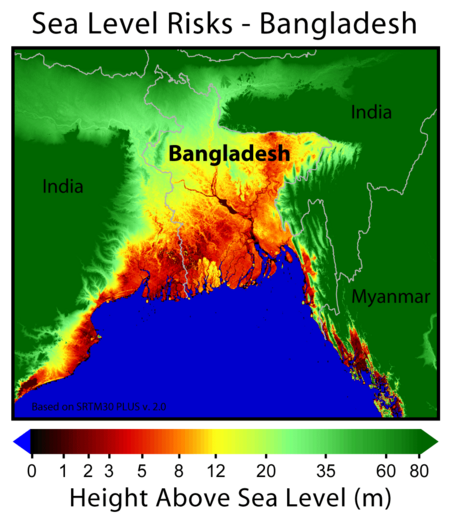|
Brochure
(Download
Brochure
(66KB.pdf)

BACKGROUNDS
Climate change is a reality now. It is
happening and has already started to influence our life. So, action is
needed to go for future activities to cope with climate change as well as
make our community more resilient to climate changes. It is time to consider
impact of climate change ahead and think how to implement adaptation through
design and planning of water sector development works as well as redesign of
existing water structures to cope with the climate change.
Among the expected impacts of climatic
changes on water resources are higher global and regional temperatures,
increases in global average precipitation and evaporation, changes in the
regional patterns of rainfall, changes in the intensity, severity, and
timing of major storms, and a wide range of other geophysical effects. These
changes will also have many secondary impacts on freshwater resources,
altering both the demand and supply of water, and changing its quality.
Being a floodplain country with average low
elevation, intensive river network, extreme poverty, high population
density, poor institutional development etc., Bangladesh is to face yet more
severe problems due to climate change. The main threats of climate change to
Bangladesh are spatial changes in freshwater and wetlands, expanded
flooding, prolonged drainage congestion, increased runoff and erosion,
wetland losses, damage of water infrastructures, salt water intrusion to
drinking water supply, inundation of treatment infrastructures, frequent
cyclone and storm surge flooding, etc. A recent special report entitled
“Bangladesh is set to disappear under the waves by end of the century” by
Johann Hari is an example of the climate change risks that Bangladesh to
face in future.
Over the years, Bangladesh government has
constructed a good number of flood control, drainage, irrigation and coastal
embankment projects in the country. The existing water structures are
valuable resources to combat future impacts of climate changes, but they
need incorporation of design changes coping with the climatic change.
Time is now to develop capacity of our water
professionals to equip them with adequate knowledge on climate change issues
for long-term water planning, design and construction of new water
infrastructure as well as incorporation of design changes of the existing
ones.
OBJECTIVES
-
To increase the
understanding of the risks of climate change and possible impacts of
climate change on water sector.
-
To
develop the capacity of water sector professionals to address climate
change hazards in planning, design and management of water sector
projects.
To increase awareness of the planners and policy makers in taking adaptive
measures.
CONTENTS
Introduction
to climate change; Implication of climate change on water resource
management; International conventions and country programs; Introduction to
climate change modeling; Application of climate change modeling on water resource management; Adaptation measures to climate change
risks on water resources management; Socio-economic implications and
adaptation of climate change; Planning for climate change risk management in Bangladesh.
limate change; Some detailing on key technologies available to help manage
climatic risks with example; Socio-economic implications and adaptation of
climate change.
WHO
SHOULD ATTEND
Project
planners; design engineers; water project managers from implementing
agencies and consulting farms; general water sector planners; academicians
and researchers who will develop and transmit the climate change knowledge.
RESOURCE PERSONS
Resource persons for the short course have been selected from BCAS,
CEGIS, IWM and IWFM of BUET.
DURATION
The
short course will be offered during 18 to 20 October, 2008.
VENUE
Directorate
of Continuing Education (DCE), BUET, Dhaka located on the third floor of the
Institute Building of BUET (near Dr. M. A. Rashid Hall and BUET Gymnasium).
LAST DATE OF APPLICATION
Nominations and applications for participation should reach the Directorate,
DCE by 15 October, 2008.
COURSE FEE
There will be no charge for the course. Tk. 500/- would be paid each day to
each participant as travel allowance.
CONTACT PERSONS
Dr. Sujit Kumar Bala
Course Coordinator & Associate
Professor
Institute of Water and Flood Management
BUET, Dhaka 1000
Email: bala@iwfm.buet.ac.bd
Telephone: 9665650-89/ Ext. 7177, 7506
Mobile: 01712557271
Web:
http://www.buet.ac.bd/iwfm
Or
Md.
Golam Rabbani
Senior Research Officer
Bangladesh Centre for Advanced Studies (BCAS) and Contact Person, CapNet-Bangladesh
House-10, Raod-16 A, Gulshan-1, Dhaka-1212
Telephone: 8851237, 8851986, 8852217 Ext. 305
Mobile: 01713248362
Email: golam.rabbani@bcas.net
Web: http://www.bcas.net
Or
Professor
Dr. M. A. Rashid Sarkar
Director
Directorate of Continuing Education
BUET, Dhaka 1000, Bangladesh
Email:
dirdce@dce.buet.ac.bd
Telephone: PABX 9665650-80/Ext 7503
8620738 (Direct)
Fax: 8613026
Web:
http://www.buet.ac.bd/dce
PROGRAMME
Presentation should 40 min lecture and 20 min discussions
Day 1: October 18, 2008
2:00 - 02:30 : Registration and Inauguration (Introduction to
Cap-Net activities in Bangladesh, Mr. Md. Golam Rabbani)
02:30 - 03:30 : Topic 1: Climate Change Risks (Dr. Atiq Rahman,
BCAS)
03:30 - 04:00 : Tea Break
04:00 - 05:00 : Topic 2:
International
conventions and country programs (Mr.
Mohammad Reazuddin, Director, DOE)
05:00 - 05:30 : Tea Break
05:30 - 06:30 : Topic 3: Economic Implications of climate change
(Mr. Nityananda Chakraborty, CEGIS)
06:30 - 07:30 : Topic
4:
Social Implications of climate change
(Dr.
Sujit Kumar Bala, IWFM, BUET)
Day 2: October 19, 2008
2:00 - 3:00 : Topic 5:
Implication of climate
change in water sector of Bangladesh (Prof.
Rezaur Rahman, IWFM, BUET)
3:00 - 3:30 : Tea Break
3:30 - 4:30 : Topic 6:
Climate
change modeling (Dr.
A.K.M. Saiful Islam, IWFM, BUET)
4:30 - 5:30 : Topic 7:
Impact of climate change on flooding and sea level rise (Mr. Abu Saleh
Khan/Mr. Emaduddin Ahmad, IWM)
5:30 - 6:00 : Tea Break
6:00 - 7:00 : Topic 8:
Planning for climate
change risk management in Bangladesh
(Mr.
Ahmadul Hassan, CEGIS)
Day 3: October 20, 2008
2:00 - 3:30 : Topic 9:
Climate change mitigation
technologies
(Mr. Iftekhar Enayetullah, Waste Concern)
3:30 - 4:00 : Tea Break
4:00 - 5:30 : Topic 10: Climate
proofing of water infrastructures: new design and rehabilitation
considerations (Mr. Gerard Pichel, DHV)
5:30 - 6:00 : Certificate Awarding
6:00 - 6:30 : Tea Break
|